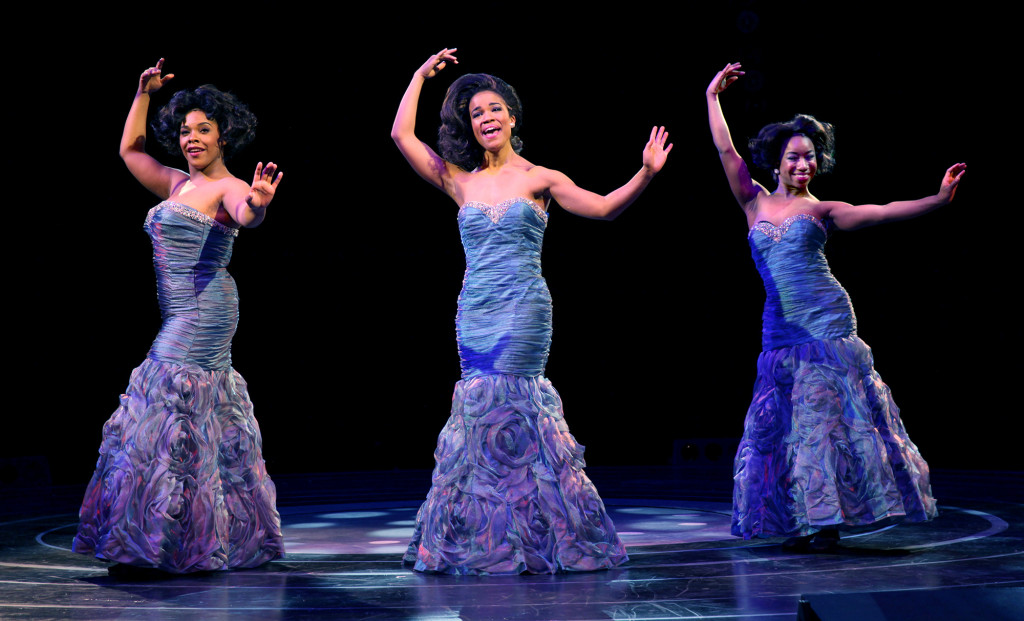
Photo©Paul Lyden
Presented by North Shore Music Theatre
Book & lyrics by Tom Eyen
Composed by Henry Krieger
Directed & choreographed by Nick Kenkel
Music direction by Jesse Vargas
June 2-14, 2015
North Shore Music Theatre
62 Dunham Road
Beverly, MA 01915
NSMT on Facebook
Review by Craig Idlebrook
Sometimes, a musical is cursed with potential. The action on stage may be enough to bring the crowd to its feet, but you can still walk away thinking it should have been something more.
North Shore Music Theatre’s production of Dreamgirls is musically complex and graced with strong performances, but it is also incomplete. As writers Tom Eyen and Henry Krieger attempt to capture the zeitgeist of a time when African American music pushed to cross over to a pop (white) audience, they bypass enticing storylines and more complex sonic landscapes that could make the story something greater than it is. Instead, we’re left with a surface-only, feel-good journey of a girl group.
As the play opens, Effie (Bryonha Marie Parham), Deena Britney Coleman (Deena Jones), and Lorrell (Destinee Rea) are taking part in an amateur contest at the famed Apollo Theater. As luck would have it, at the same theatre famous soul singer James “Thunder” Early (Eric LaJuan Summers) has just alienated his background singers, most likely with his sexual escapades. Desperate, his manager, Marty (JC Montgomery), and a fake-it-till-you-make-it-car salesman-turned-manager, Curtis (Grasan Kingsberry), convince Early and the three young singers they need each other.
It is here that the play is at its richest, as the ensemble of characters decide which paths to take and see which obstacles lay in their way to success. Each is somehow limited by society because of their African-American identity, and this is most notable when an original song written by the group’s songster, C.C. White (Noah J. Ricketts), is blatantly ripped off and given to a white singer. Early, though a master at his craft of R&B, realizes his career arc is trending downward, and will continue to do so unless he can cross over to a white audience. Musical styles clash as the frustration of the characters grow, culminating in the best moment of the play, a dangerous and sinuous musical moment when the managers and songwriter decide to use payola to get their music to a white audience.
Unfortunately, as the singing trio breaks away from Early to form their own group, the musical and moral compromises made for success robs the play of its power. The songs become dumbed down and vacant, essentially winsome appeals for the white audience to love them. While Early is allowed to react to how boring his bland act becomes, the female singers have fewer doubts, making them sometimes seem like mannequins manipulated by the male characters. It is amazing that the trio of singers lives, on the road and at home, with these morally ambiguous male characters, yet maintain an (almost) plausible deniability of their illegal acts.
At this point, the play also seems to thumb its nose at continued musical innovation. At one point, Early cuts his performance short to start improvising with his band onstage, creating a new and spontaneous sound. Each band member lays down individual loops of melody that he riffs over, and it blends together into heavy funk that hints at early rap. Then, inexplicably, the character of Early is forced by the authors to drop his pants on stage, and that is the last we really hear of him during the play. He is shunned; his last chance at a career squandered.
Likewise, the world these characters live in is also dumbed down, so that all the problems the singers might face in the music business (continued racism, drugs, domineering managers, mental illness) is boiled down to conflicts over love and infidelity. There is no need for a play about African Americans to focus on BIG ISSUES to be of value, but the play appears to be shortchanging its characters in going for a PG rating. Don’t think; just tap your toes and clap to the beat, it signals to the audience.
There are moments, however, when the play still shows its tantalizing prowess. Effie is the most complex of the three singers in the original group, and it is a loss to the audience that she is kicked out. She exhibits bizarre lovesick behavior over Curtis that is never fully explained, and is deemed unreliable. She is replaced by another singer who is written with all the depth of Ernie Hudson’s character in Ghostbusters. Rather than accept her pink slip, Effie refuses to surrender, or leave the dressing room, as she argues with Curtis in the soulful number, “And I Am Telling You I’m Not Going.” She drives Curtis from the room with her determination, and yet she keeps singing. It’s a moment which almost looks embarrassing, except that Parham never backs down and continues singing the number to an empty room, and the sad song blows the audience away.
That’s what this musical could have been.
